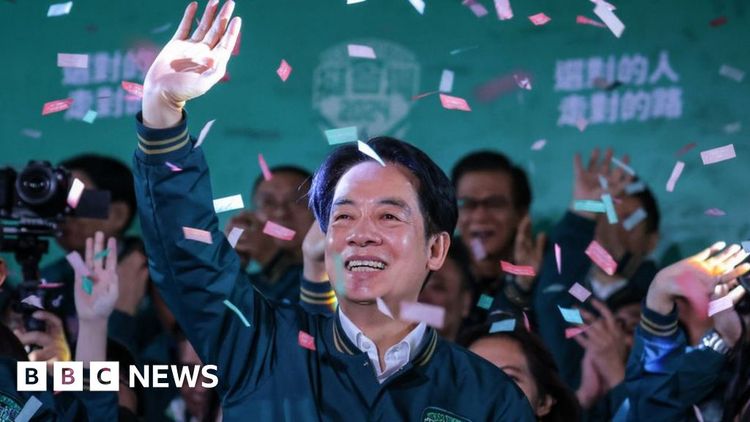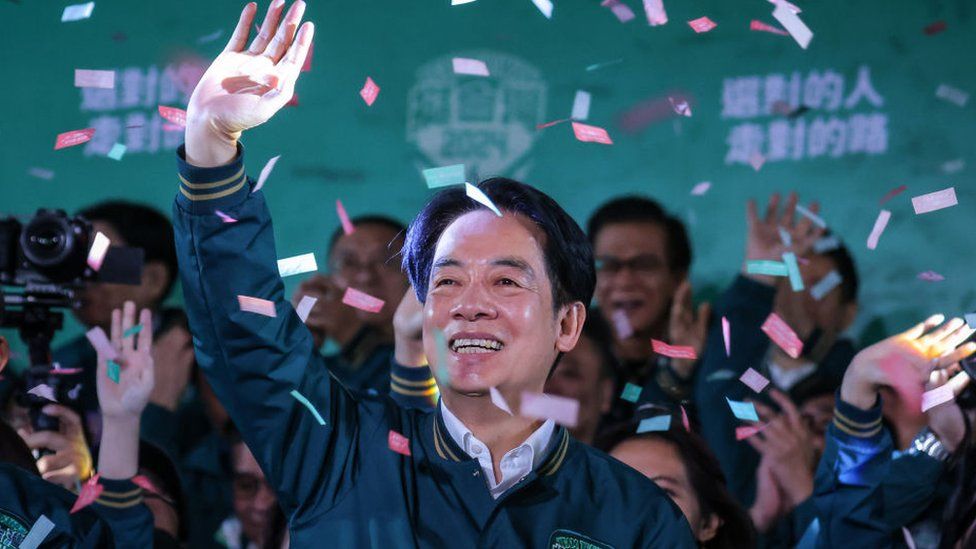Taiwan elects William Lai president in historic election

The picture has been sourced from Getty Images.
Mr. Lai emerged victorious with 40% of the total votes cast, leaving his two competitors far behind.

In a significant election, the citizens of Taiwan elected William Lai as their leader. This decision solidified their direction as a nation, which is heading in a different direction than China.
It is probable that Beijing will become upset by the outcome, as they refer to Mr. Lai as a "troublemaker" due to his stance on independence.
China states that Taiwan, which governs itself, belongs to them. They have expressed a desire for a calm reunion, but they have not completely disregarded the possibility of applying violence.
The Taiwan election was presented as a decision between "conflict and harmony".
The government of Beijing, which is run by communists, hates the Democratic Progressive Party (DPP) of Mr Lai due to their pro-sovereignty stance. The DPP has been in charge of Taiwan for eight years. China has increased its military activity near the island, causing concern that a fight may break out.
Mr Lai has made history by leading his party to win a third straight term in the presidential election. When his challengers surrendered, he indicated that this was a path that could not be altered.
During a press conference, he stated that the nation will persist on progressing and not regress by looking back.
Afterwards, when he spoke to an immense crowd of joyous followers on the roads of Taipei, Mr. Lai explained his victory as a success for democracy.
"We made it happen. We didn't allow any outside factors to impact our election. This was possible as we believed that it is our sole responsibility to elect our president," he stated. Taiwan had previously alleged that China was trying to intervene in the election before it took place.
However, Mr. Lai also had a statement directed towards China.
He informed the journalists that he preferred promoting discussions and communication rather than impeding progress and rivalry. Moreover, he proposed the necessity of maintaining harmony and steadiness with Beijing.
Simultaneously, he included that he plans to "keep the status quo of cross-strait relations" and will neither push for independence nor join with China. Additionally, he committed to protecting Taiwan from any possible threats that may arise from China.
In previous statements, Mr. Lai stated his support for independence for Taiwan, which goes against Beijing's policies. However, in recent months, he has emphasized that he would not actively push for independence if he were elected president.
Mr. Lai secured a significant 40% of the votes, ensuring his lead against Hou Yu-ih from the Kuomintang (KMT) party, the main opposition. Since the year 2000, Taiwan has seen a political shift between the DPP and the KMT, with the latter being known for maintaining a positive relationship with Beijing.
The up-and-coming political figure Ko Wen-je, a maverick member of the Taiwan People's Party, has successfully garnered a significant portion of the votes, specifically a quarter of them, due to his immense popularity with the younger demographic of voters.
On Saturday, the people who were eligible to vote also elected their lawmakers. According to reports from various media outlets in Taiwan, the DPP has now lost its majority status in the legislature while the opposing parties have made significant progress. Despite this development, no single party has secured enough seats to dominate the parliament.
Experts suggest that if the president of DPP heads an opposition-dominated legislature, then managing the affairs of Taiwan could become more complicated and uncertain.
Discover further information on the Taiwan election:







































































